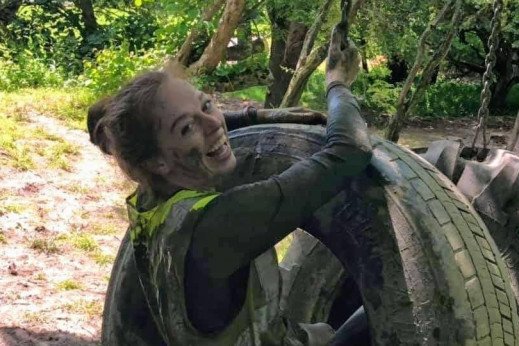My anorexia started when I was just 11 years old. However, I wasn’t officially diagnosed until 10 years later. That is a decade of illness before I started treatment, by which time my ED was well and truly ingrained. So how did this happen, and why?
Anorexia is a very secretive and sneaky disease. Looking back, I can see the trigger came in my final year of primary school after the death of my beloved grandmother. I remember on the day of her funeral being completely obsessed by the size of my stomach – it seemed enormous and I spent ages in the bathroom measuring it, feeling utterly disgusted with myself. I vowed then to make it go away.
Instead of losing weight drastically, I simply failed to gain as a growing child or adolescent should. I think this is the main reason my illness went undetected. When I was 13, the school nurse was concerned by my weight. However, my parents and teachers mistakenly believed I was fine because they saw me eat. I think there is a common misconception that people with anorexia don’t eat. I ate when people were looking, just never enough to sustain me.
Alarm bells only went off when I was at university. I was training to be a doctor. Already a low weight, I couldn’t cope with the pressure of the course, the feeling that I didn’t fit in, and being away from home. I starved myself to numb difficult emotions. My weight plummeted. I had to drop out of med school. Then one day I collapsed. I was admitted to a general hospital to medically stabilise me before I could be transferred to the ED unit.
For years I had revolving door hospital admissions. I nearly lost my life more than once. I would be sectioned under the Mental Health Act and force-fed. I fought and fought to keep my anorexia. It was my friend. When I was 28, my psychiatrist informed me that they were withdrawing active treatment and would switch to a more palliative approach. This frightened me. My family refused to believe that anorexia was a terminal illness. I ended up going to a clinic on the other side of the world for intensive treatment – therapy as well as food.
Now, aged 35, I can say I am in recovery. My body has found the place it wants to be. It is a point I do not have to restrict to maintain. But eating disorders are mental illnesses and therefore not about weight. So how is my mind these days? Part of my illness was the feeling that I was not good enough. In my anorexia I was always comparing myself to others and I never measured up. In early recovery I compared myself to others in recovery and I was coming up short. A recovery is as unique as each of us is. We all have our own paths to get there and I think you just know, in your heart of hearts, when you arrive. I thought recovery would see me married, baby on the way, amazing career, etc. Have I been sold short because I have achieved none of these things? No, I don’t think so. I have something I value far more. I have contentment and a feeling of peace that comes from my new-found self-acceptance, and above all, I have hope. For me, these are the gifts of recovery. For you, it may be something different, but no less valid, because it’s your recovery.
I still hear the anorexic voice. It’s quieter now, but it’s still there. I just don’t act on it. For me, recovery is managing this chronic condition as one would, say, diabetes. I live with it, the keyword being live. I no longer merely exist. I enjoy my life. I have my struggles, my bad days, my lapses, even, but I keep going. I use my voice now. I ask for help when I need it. I am incredibly lucky to have such supportive family and friends. I am good enough. And you are too.
Contributed by Catherine
What happens when you start to feed your brain again?
5 May 2021You have to learn how to live again and, like with any lessons, you often have to fail to learn the best way or the right way...
"Things can improve, even when it feels hopeless"
29 April 2021In the past I’ve wanted to hide the eating disorders that are part of my history, but I want to shout from the rooftops: I'm proud of how far I had come!
"This year has taught me to be kinder to myself"
21 December 2020What a year 2020 has been in general for everyone – it was a year no one ever could have imagined, from panic buying, toilet roll shortages, lockdowns and restrictions. Yet for so many, including me, the battle against an eating disorder continued.


